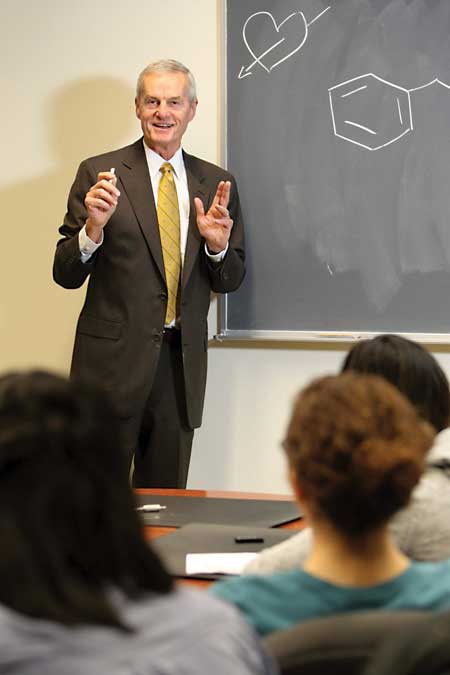
Priority is to enhance science teaching and outreach
By Neale McDevitt
David Harpp officially began his tenure as Tomlinson Chair in University Science Teaching on February 1. But as anyone who knows the long-standing chemistry prof will tell you, he’s been preparing for this his whole professional life. “It’s a pretty good fit,” said Harpp from his Otto Maas office, smiling the smile of a man who thoroughly enjoys understatement.
The Tomlinson Chair, whose mandate is to conduct research and teaching that will advance the understanding and practice of science education, was one of many essential parts of McGill that was created thanks to the landmark $65-million gift made to the University by Richard Tomlinson in 2000.
It was said that Tomlinson, a noted Canadian scientist and businessman, believed the way science was being taught in many classrooms could be improved. As a result, part of his gift was earmarked to create the Tomlinson Project in University-Level Science Education (T-PULSE), was created to support the development of more effective teaching methods for university level science students and the dissemination of these techniques to the professoriate. T-PULSE funds the Tomlinson Chair in University Science Teaching along with a handful of science graduate students called Tomlinson Fellows.
Always innovating
One of McGill’s most beloved and successful professors (in 2010, he became the first recipient of McGill’s Lifetime Achievement Award for Leadership in Learning), Harpp has been challenging himself to become a better teacher for more than 47 years at McGill.
As a young chemistry professor he created homemade stop-motion slides to illustrate molecular movement “so students could actually see what was happening and not just hear about it.” He also began recording his lectures in the 1960s before moving to videotaping them, laying the groundwork for COOL (Courses Online) McGill, a repository of captured classes and lectures and an essential tool in the modern learning process at the University that has become the standard for similar systems at sister institutions around the world.
Needless to say, Harpp has been kicking around a few ideas since being appointed Chair.
“My priority is to enhance the teaching and outreach of science at all levels, from elementary schools right through university,” said Harpp. “I think this is in keeping with the spirit of Mr. Tomlinson’s original gift.”
One of Harpp’s plans is to give more undergraduates the opportunity to teach and tutor. He wants to expand an existing initiative in which undergraduates who have successfully completed the World of Chemistry survey course return to assist in the tutoring of class material prior to midterms and final exams. These Tomlinson Teaching Award winners – who receive a stipend for their efforts – lead a variety of quizzes and tutoring sessions to help their peers prepare for midterms and final exams.
“Right now we only do this for the World of Chem course,” said Harpp, “but I want to expand this type of program across the Faculty. I honestly believe we can have the Teaching Award for up to 200 undergraduates. And, in speaking with my faculty colleagues, they’d love to benefit from the help of these talented, motivated students.”
Invaluable experience
Florence Blackman, a U2 anatomy student worked with Harpp and the World of Chem course this past two years and says the experience was eye-opening. “The best part is being able to clarify material for people who are a little confused,” she said. “But it also has given me real insight into what it is like to teach. The whole experience has been invaluable.”
As is his wont, Harpp has lots of other ideas percolating, including possibly establishing a Tomlinson Research Award that provides modest stipends for undergrads looking to volunteer in a lab; and better support the multitude of science outreach projects that already exist at McGill.
“There are so many wonderful outreach programs originating from within this Faculty that nobody hears about,” said Harpp. “I want to support these projects in any way I can, including helping them with getting the word out and in getting more funds.”

Westmount Science brings science outreach to kids 6-13 and is completely aligned with Tomlinson’s original objective, which “believed the way science was being taught in many classrooms could be improved”. We are proud to be building an association within McGill University through the support of the Tomlinson Foundation, among others. We are aiming to be running a summer science camp for 6-13 year olds on campus in 2014, facilitated by scientists from all disciplines at McGill University. We have already had two very successful years running this camp out of Westmount High School and are now planning to open our… Read more »